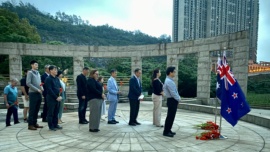Portugal’s programme of the Commemorative Commission for the 50th anniversary of the 25th of April in Lisbon on Thursday begins with a military ceremony in Terreiro do Paço (downtown riverside area) in the presence of the country’s president, Marcelo Rebelo de Sousa.
The celebrations, which begin at 09:00, include at 09:40 the historical re-enactment ‘Operation end of regime’, which began the previous day at the Practical Cavalry School in Santarém, with the collaboration of the Portuguese Association of Antique Military Vehicles.
A replica of the column commanded by Captain Salgueiro Maia, which 50 years ago left Santarém for Lisbon, arrives at Terreiro do Paço in time to parade in front of Marcelo Rebelo de Sousa and other organisations.
The old army vehicles will be parked there until 12 noon, allowing citizens to interact with the April soldiers present.
‘An “M47 Patton” combat car will also be on display, representing the military forces loyal to Marcelo Caetano’s government,’ says the Commemorative Commission, led by historian and executive commissioner Maria Inácia Rezola.
The commission ‘joins the collective mobilisation to mark the 50th anniversary of the overthrow of the dictatorship and celebrate 50 years of freedom’ in the streets of Lisbon, calling on citizens to walk ‘the paths of the revolution’.
The successful coup carried out half a century ago by the Armed Forces Movement (MFA) overthrew the authoritarian regime that had been in force for 48 years in Portugal, first as the National Dictatorship, after 28 May 1926, and then as Salazar’s Estado Novo, when the corporatist-inspired Constitution came into force in 1933.
At 11.30am, the Parliament, in São Bento, will hold a solemn ceremony to mark the 50th anniversary of 25 April.
Meanwhile, in the Baixa (downtown) area of Lisbon, the ‘Operation end of regime’ re-enactment resumes at 12:00.
‘The old military vehicles will begin to recreate the march on the Carmo Barracks and the siege of the site. The route taken in 1974 will be re-enacted, leaving from Terreiro do Paço to Rossio, going up Rua do Carmo and Rua do Sacramento,’ according to the programme.
The vehicles, which symbolise the MFA, will then be on display in Largo do Carmo until 4pm, with the Carmo Barracks open to the public all day.
Organised by the Comissão Promotora das Comemorações Populares, the traditional 25th April parade on Avenida da Liberdade starts at 3pm and ends at Rossio, where political speeches and cultural moments take place.
At 4pm, the historical re-enactment begins again at Largo do Carmo, from where a military column leaves for the Pontinha barracks, staging the transport of the deposed President of the Council, Marcelo Caetano, to the MFA command post, where the coup strategist and then Major Otelo Saraiva de Carvalho was stationed.
In Lisbon, the commemorations begin today at 10pm in Terreiro do Paço with the show ‘An idea of the future’ and the video mapping ‘25 April, Thursday’.
The audiovisual show, with free entry, features six young people ‘who draw a portrait of today’s Portugal and show how far we’ve come’, as well as 180 musicians who build the soundtrack from themes by José Afonso, José Mário Branco, Sérgio Godinho, Fausto, Adriano Correia de Oliveira, Fernando Lopes Graça and Carlos Paredes.
Also tonight, at 10.15pm, in Porto, on Avenida dos Aliados, there will be a concert entitled ‘Aliados à liberdade’ (Allies to freedom) and the same video mapping projection.
The Canto Nono, Vozes da Rádio and Coral de Letras da Universidade do Porto are taking part. Pedro Lamares and Odete Moço will also be on stage, combining voices with poetry.
In Santarém, the programme starts tonight at 9pm and includes video mapping and the play ‘Esta é a madrugada que eu esperava’, (this is the early morning I was expecting), directed by Rita Lello and written by Colonel Correia Bernardo.
According to a study by the Institute of Social Sciences of the University of Lisbon and ISCTE – Instituto Universitário de Lisboa, released on Friday, the 25th of April 1974 is the most important event in Portugal’s history for 65% of those surveyed.




















